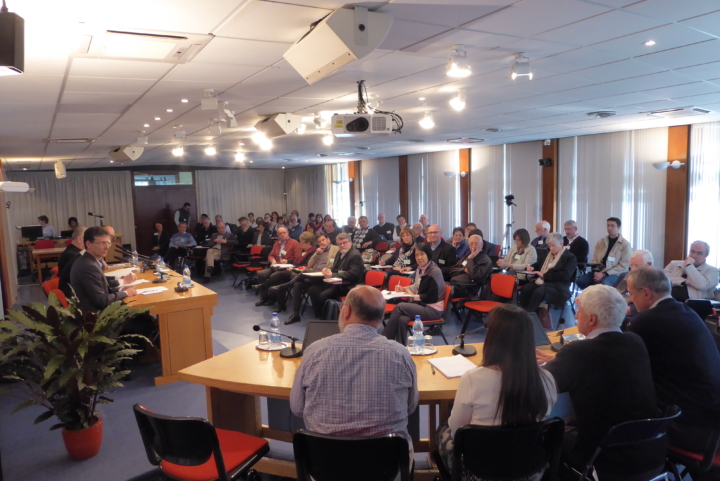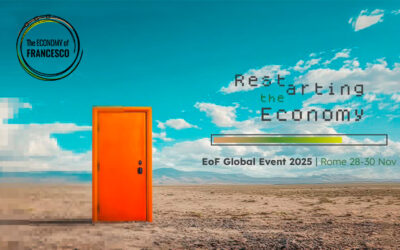 The Gospel and Culture is a delicate topic. It has been widely discussed for centuries in theological, sociological, pastoral, political and educational environments. There are Church documents, such as Evangelization in the Modern World and the Gospel of Joy that are indispensable references. If you add the word “charism” to the mix – which nowadays is being attributed to non-ecclesial figures and realities as well – then the search for agreement becomes challenging, especially when you put together experts from different cultures. Yet, this was the striking feature of the “Gospel – Charism – Culture” conference held on April 6-7 at the Focolare International Centre in Rocca di Papa, Italy. In her welcome address, Maria Voce pointed out the deep goal of the gathering: to promote “a culture of peace, a culture of resurrection” that will have a growing impact.” Experts from Asia, Africa, the Americas and Europe compared notes during three thematic sessions. Charisms and the evangelization of the culture. The first session dealt with two questions: “How to respond to the urgency of the Gospel becoming culture” by Archbishop Zani; “How to accelerate the communion among charisms in the face of present challenges?” by Sister Motta; and how “nowadays, many “charisms” are born in non-religious environments, while there is not enough prophecy in the Church itself,” by Luigino Bruni. During successive discussions the experts underlined how “every confrontation with the other is an encounter with a social family’s history and culture” (Guadiano); that “the media have their own charism for a united world, if they maintain their autonomy” (Zanzucchi); that “the evangelization of the culture does not pass through the authority, but through the witness” (Archbishop Zani). Finally, there was the appeal made by Bruni: “We need a new narrative; the young people of today do not understand a language from the 1900s.” From inculturation to interculturality. The second session was opened by Jesús Morán: “European elaborations on culture are far from all there is to say about Christ. In the encounter with other cultures something is expressed that has not yet been expressed.” The goal, as Philippine Andrew Recepcion recalled, “is not a non-Western Christianity, but a beyond-Western [Christianity].” Soni Vargas from Bolivia showed some passion when asking that we move on from the paradigm of inculturation, which does not express the active reciprocity required by Chiara Lubich, to a paradigm of interculturality: “No longer “mission”, but “inter-gift” within a Trinitarian dynamic in which a superiority of one culture over another doesn’t even exist.” During the debate, Chinese Vania Cheng, remarked: “Asia is asking for listening, respect and silence because the inner being reveals more than the word.” Cameroonian, Raphael Takougang, remembered that “in interculturation,the knowledge isn’t communicated, it’s passed on by having an experience together.” Roberto Catalano underscored what Chiara had seen long ago when she invited everyone to “make Christ to be born in the heart of the cultures.” Lucas Cerviño, who was on a link-up from Mexico: “I need to create the conditions so that the seed of God that is already inside a culture can flower . . . but never imposing the way.” Morán concluded: “It’s true that there must not be control or superiority of a culture over another, but this doesn’t mean that there isn’t a central point: Christ is the heart of the world.” Youth – faith – vocational discernment. The third session focused on the upcoming Synod of Bishops and was opened by Italo Fiorin: “Educating means helping an other to find the meaning of his or her own existence. Educating is the art of accompanying.” Sister Jenny Favarian testified to how: “the discovery of the vocation to love makes totally beautiful flowers to blossom.” Maria Rosa Logozzo told about the contact of a group of young people from different cultures – both believers and non-believers – with the focolare in Dublin, Ireland: “The possibility of having an experience of God in a community draws them.” After a rich debate, Fiorin concluded by underscoring the importance of the “pedagogy of reality” and especially of service learning: “learning to serve; serving to learn.” On the final afternoon, theologian Piero Coda gave a presentation on the question: What does it mean when we say that the Church is born from the abandonment of Jesus on the cross? “A life in exile: the capacity to detach from one’s own roots in order to live the other . . . testifying to the folly of God’s love. . .” The discussions from these two days, Francisco Canzani recalled, will be transformed into articles for the Gen magazines, Unità e Carismi, Nuova Umanità, Città Nuova that will help to reflect on current ecclesial and cultural times.
The Gospel and Culture is a delicate topic. It has been widely discussed for centuries in theological, sociological, pastoral, political and educational environments. There are Church documents, such as Evangelization in the Modern World and the Gospel of Joy that are indispensable references. If you add the word “charism” to the mix – which nowadays is being attributed to non-ecclesial figures and realities as well – then the search for agreement becomes challenging, especially when you put together experts from different cultures. Yet, this was the striking feature of the “Gospel – Charism – Culture” conference held on April 6-7 at the Focolare International Centre in Rocca di Papa, Italy. In her welcome address, Maria Voce pointed out the deep goal of the gathering: to promote “a culture of peace, a culture of resurrection” that will have a growing impact.” Experts from Asia, Africa, the Americas and Europe compared notes during three thematic sessions. Charisms and the evangelization of the culture. The first session dealt with two questions: “How to respond to the urgency of the Gospel becoming culture” by Archbishop Zani; “How to accelerate the communion among charisms in the face of present challenges?” by Sister Motta; and how “nowadays, many “charisms” are born in non-religious environments, while there is not enough prophecy in the Church itself,” by Luigino Bruni. During successive discussions the experts underlined how “every confrontation with the other is an encounter with a social family’s history and culture” (Guadiano); that “the media have their own charism for a united world, if they maintain their autonomy” (Zanzucchi); that “the evangelization of the culture does not pass through the authority, but through the witness” (Archbishop Zani). Finally, there was the appeal made by Bruni: “We need a new narrative; the young people of today do not understand a language from the 1900s.” From inculturation to interculturality. The second session was opened by Jesús Morán: “European elaborations on culture are far from all there is to say about Christ. In the encounter with other cultures something is expressed that has not yet been expressed.” The goal, as Philippine Andrew Recepcion recalled, “is not a non-Western Christianity, but a beyond-Western [Christianity].” Soni Vargas from Bolivia showed some passion when asking that we move on from the paradigm of inculturation, which does not express the active reciprocity required by Chiara Lubich, to a paradigm of interculturality: “No longer “mission”, but “inter-gift” within a Trinitarian dynamic in which a superiority of one culture over another doesn’t even exist.” During the debate, Chinese Vania Cheng, remarked: “Asia is asking for listening, respect and silence because the inner being reveals more than the word.” Cameroonian, Raphael Takougang, remembered that “in interculturation,the knowledge isn’t communicated, it’s passed on by having an experience together.” Roberto Catalano underscored what Chiara had seen long ago when she invited everyone to “make Christ to be born in the heart of the cultures.” Lucas Cerviño, who was on a link-up from Mexico: “I need to create the conditions so that the seed of God that is already inside a culture can flower . . . but never imposing the way.” Morán concluded: “It’s true that there must not be control or superiority of a culture over another, but this doesn’t mean that there isn’t a central point: Christ is the heart of the world.” Youth – faith – vocational discernment. The third session focused on the upcoming Synod of Bishops and was opened by Italo Fiorin: “Educating means helping an other to find the meaning of his or her own existence. Educating is the art of accompanying.” Sister Jenny Favarian testified to how: “the discovery of the vocation to love makes totally beautiful flowers to blossom.” Maria Rosa Logozzo told about the contact of a group of young people from different cultures – both believers and non-believers – with the focolare in Dublin, Ireland: “The possibility of having an experience of God in a community draws them.” After a rich debate, Fiorin concluded by underscoring the importance of the “pedagogy of reality” and especially of service learning: “learning to serve; serving to learn.” On the final afternoon, theologian Piero Coda gave a presentation on the question: What does it mean when we say that the Church is born from the abandonment of Jesus on the cross? “A life in exile: the capacity to detach from one’s own roots in order to live the other . . . testifying to the folly of God’s love. . .” The discussions from these two days, Francisco Canzani recalled, will be transformed into articles for the Gen magazines, Unità e Carismi, Nuova Umanità, Città Nuova that will help to reflect on current ecclesial and cultural times.
Yes to God
Yes to God




0 Comments